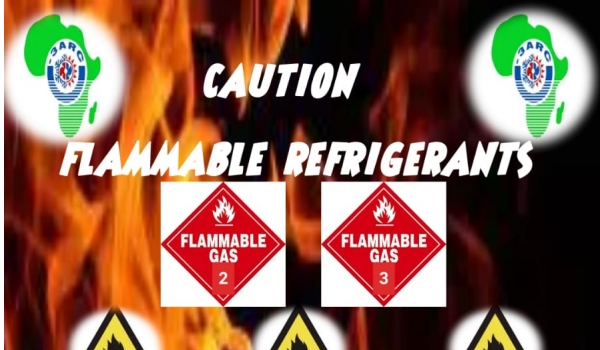New refrigerants – Professionals sound the alarm
Replacing refrigerants that harm the ozone layer with new, so-called ecological or alternative, but flammable refrigerants must be done with tact and after taking all the precautions and arrangements that would prevent a massacre. In this interview, Madi Sakandé, president of U-3ARC, takes over from his peer experts and technicians to warn of the very significant risks of supplying the African market, without taking the time to train the technicians and raise mass awareness among users, as in Europe and the USA.
New refrigerants are welcome. What fears do you have about Africa?

Madi Sakandé: Regarding new refrigerants, we must understand that with the climate changes we are experiencing in recent years, the refrigeration sector is being taken to task. It turned out that the refrigerants used in refrigeration systems contain, on the one hand, chlorine which harms the ozone layer, and on the other hand, fluorine which is a greenhouse effect element. It was then decided by the United Nations, first with the Montreal Protocol in 1987 and its Kigali Amendment in 2016, to replace these refrigerants with “new refrigerants” called “ecological or alternative”. The other side of the coin is that these new refrigerants could have a very dangerous impact on humans, in that they are flammable. For African technicians who have until now used non-flammable refrigerants, the risk is very significant. More than 90% of African technicians are unaware of the risk involved in handling such refrigerants.
The danger involved is fires and explosions, already recorded in certain African countries, with the use of these refrigerants in domestic refrigerators (R600a or Isobutane). Imagine, air conditioners, loaded with this type of refrigerant, in particular R290 which is propane! Propane is from the butane gas family used for cooking... You see from here the table, in the refrigeration unit, we put the kitchen gas and the technician, who is not aware, loads a quantity inappropriate, since you must have a scale, adequate tools as well as the related knowledge to avoid burning yourself during work or even creating successive explosions, in the event of overload... In the event of leaks in the house , the air-refrigerant mixture could create these explosions later in the event of sparks of various origins, either activation of a switch or activation of an answer or call from a cell phone, lighting of a lighter ... Both the refrigeration technician and the user must be aware. Which is unfortunately not yet the case, on a very large scale, in Africa. It's very dangerous ! We are very worried about the approach to this technology already present on the continent, through structures that promote it without really knowing the reality of the refrigeration sector in Africa.

Are these types of technologies used in the countries of origin of these agencies promoting it in Africa?
The level of use of these technologies is quite varied and limited, taking into account security. Imagine that split systems, which use R290, which is highly flammable or even explosive, are strictly prohibited in Europe! It is only from 2027 that their use will be authorized. What does that mean ? This means that we are giving European technicians time to be trained, to become familiar with the handling of these refrigerants, before they are put on sale on the market. If we ask European technicians, better equipped and better trained, for a latency time before any use, what about those who operate in Africa? Are our technicians ready for? Unfortunately, “so-called African development and aid” agencies are promoting this technology. We find it absurd that we are coming to test it in Africa, supporting decarbonization. Since when has Africa, which suffers from a glaring lack of industrialization, been so polluted? Decarbonizing devices are more appropriate in highly polluted environments... With people who have neither the necessary skills nor knowledge, we risk losing human lives, both among technicians and among users.
That countries, which consider these products adequate in terms of energy efficiency, and eco-responsible, also take into account the aspect of security and safety of people, before throwing themselves headlong into projects without understanding the ins and outs. It is important that African countries that want to adopt these technologies know the pros and cons or the gain and the risk…
What are the prerequisites for such diffusion on the continent?
For the diffusion of such technology in Africa, the prerequisites firstly involve mass awareness, that is to say the user. Climate change affects all humans. Firstly, it is necessary that all users are informed of the danger that lies behind the use of these new refrigerants, certainly eco-responsible but unfortunately dangerous for humans. Secondly, we must train all the technicians, including those who learned the job of refrigeration engineer on the job. This informal side, of refrigeration engineers who have no knowledge of thermodynamics, must be taken into consideration. Also, when we only train 10, 20 or 30, or even 100 technicians in a country where there are 4,000, 5,000, 6,000 or 1 million, do you understand the danger? Worse, many non-technicians go into the field and manipulate... it often happens that it is only bureaucrats and other engineers who follow training to only receive per diems. In the end, a large number are not very concerned about the application of what they have learned in the field. The technicians who work with them will not be informed of the dangers in handling these new refrigerants. It is very important that technicians are informed. To do this, a census of all technicians on the continent is necessary. They will thus be informed and we could mitigate a cataclysm, if not avoid it. U-3ARC has also been in the process of listing, since January 2022, on its website (https://www.u-3arc.org/fr/feed...), all African technicians for this purpose.
In your opinion, do Western countries do all the training in this direction? If yes, on what scale?
It is clear that Western countries are the most polluted. Logic would dictate that these technologies would first be used in these countries. As far as I know, this type of technology is not yet in use in the United States of America, precisely because they are dangerous. In Europe, split-systems (with 2 elements, an evaporator and a condenser), that is to say, the air conditioners mainly used in Africa, loaded with R290 or propane, will only be used from 2027, by decision of the European Union trilogy, taken on October 5, 2023. In 04 years, this will give technicians time to train and prepare for the handling of alternative refrigerants.
Unfortunately in Africa, this is not the case, products with new refrigerants are starting to be dumped there and training leaves something to be desired. The risks are very very significant! Of course, we aspire to a healthy environment but with human beings in it. If the latter are decimated, what use would the healthy environment have? Unless this constitutes another excuse to decimate a few more human lives in Africa, given the increase in the birth rate on the “continent, Cradle of Humanity”. The question of security thus takes on its full scope. We don’t wait until there is a tragedy to do “the doctor after death”. We want to avoid catastrophe in Africa and everywhere else in the world. We suggest that, on the continent, consultation be done with African experts. It is necessary, even imperative, that the political-administrative authorities put in place strict regulations or a framework law for the use and handling of these new refrigerants. Let's not lose sight of the fact that not all gifts are good to take. Some of them harbor dangers against populations.
Comments collected by D. Mbaye
